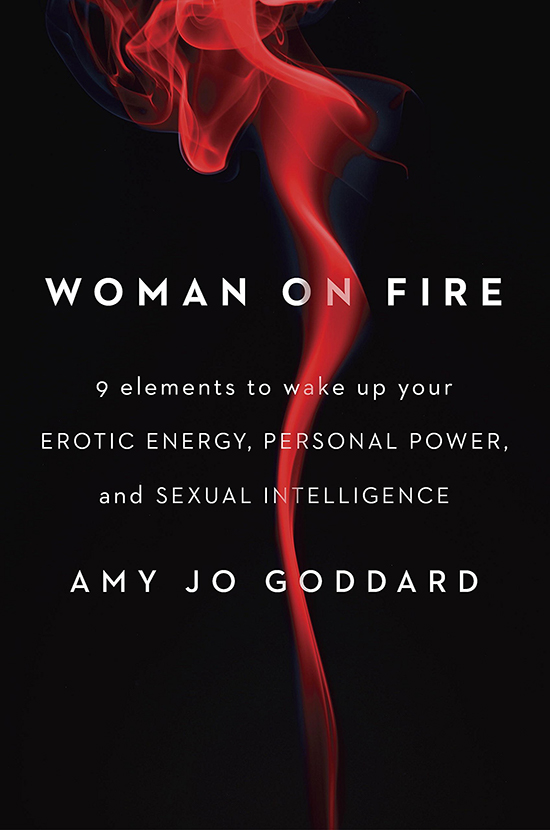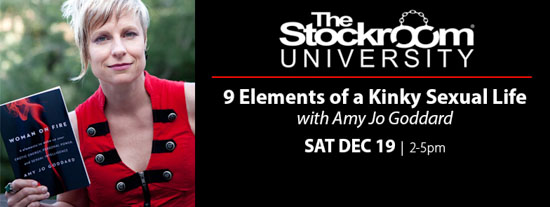In over two decades as an educator and Sexual Empowerment Coach, Amy Jo Goddard has spoken about sexuality t0 almost every kind of audience conceivable, from first graders to hardcore kinksters. She considers healing the shame and guilt that makes so many people feel like their sexuality is “broken” to be an essential public health issue. “I think sexuality is the core of who we are and that when we are happy and fulfilled as sexual people, we create happy and fulfilled lives,” she writes on her personal site.
This Saturday, she comes to Stockroom Hall in Los Angeles to speak specifically about building satisfaction and power in the context of kinky sex. We talked with her a little about what she thinks is wrong about our society’s attitudes towards sex, how we can work towards healing that feeling of brokenness, and where kink fits into all that.
Can you give me a quick description of what your class covers?
My new book, Woman on Fire: 9 Elements to Wake Up Your Erotic Energy, Personal Power, and Sexual Intelligence is based on the work that I’ve been doing with adults, primarily with women, over the last five or six years, and those elements came very organically out of the work that I was doing and the conversations I was having with people. Like, what is it that everyone seems to need? So that’s kind of how that was developed. So last year, I was invited to teach at a kink event and decided that it would be fun to teach something that was really geared around how those elements impact our kinky life, or how they engage and enhance our kinky life. So that was kind of the genesis of it.
I ended up teaching the class and just having an amazingly rich conversation about sexual power, how we use sexual power, what it means to really up the ante in our kinky scenes and in how we’re approaching power dynamics in roleplay and other play. It’s for people who really want to drop in more deeply into what all of it means and get away from it just being about a technique or a look or a style. Especially when we’re new to kink, there’s not always as much depth because people are just trying to figure out how to do things. But it’s really about looking at the bigger picture and handling power in kink.
Are the 9 Elements the same in your kink workshop as in the book?
I use the same elements. In teaching this, I’ve applied those elements to kink. It’s not to say that these are the end-all, be-all elements. Of course, we can talk about consent and we can talk about “the rules,” and all those things. It’s really when you look at things like using your voice, using emotion, using desire, using what you’re giving yourself permission for, using play. When we really look at that in terms of kink, what does that look like, and what’s important about each one?
What does that start to look like when you apply these elements to kink as opposed to a vanilla context? What different responses do you get from an audience?
What I always love about teaching in kinky environments is that I think we can drop into more of the nuance and the depth of sex in a way that your general audience doesn’t know how to do. They don’t have that. In the kink audience or kink communities, there’s already this shared language of how we do things, why we do it the way we do it, what the rules are, and so I think the difference for me, when I teach in that environment what might be similar concepts is just that depth that we can take play to this whole other level that I don’t think most people know how to do.

One of the questions that you ask in your TedX lecture is “Why do so many women think that they are sexually broken?” When speaking to kinky audiences, do you get that same response from women who feel shame or broken in their sexuality?
I think that there’s less of it because there’s so much more permission that we get if you’ve been in kink communities. You’ve obviously given yourself more permission, because otherwise you wouldn’t even be there to begin with. You have permission to explore, to find out who you are authentically as a sexual person, and to stop trying to be something that the rest of the world tells you you’re supposed to be. And I think that’s where a lot of that brokenness stuff comes from.
And then, I think that the brokenness stuff also tends to come from feeling like “I’m not doing it right. I’m not doing it like everybody else. Or, “There’s something that’s wonky about my body.” Or doubts about how sex is working. Like something’s really painful, or you don’t seem to have the same orgasmic response as everybody else. Things like that.
I think that in a kink context, if you go to events, you get to actually see other people play and you get to have more of a sense of people in terms of the reality of what their play life or sex life looks like, I think there is less of that [brokenness]. Does it mean that there are not people in the kink world who don’t think they’re broken? No. There definitely are. I think that people sometimes come to the kink world seeing it as a potential solution for some of that. And for some people it might be, and for other people that might not be the thing that they need at all.
I always find it funny — I do a “dirty talk” class, and any time I teach the dirty talk class in a kink environment and I talk about the continuum of erotic talk, it’s the romantic talk that tends to be really edgy for the kinksters. I think the vulnerability and romance is part of that. It can be really hard for people. So I think that different things like that will come up in terms of the things that people are needing or the places where their shame might come up that I don’t think is typical of a more mainstream audience.
You’ve also talked about the problems of sex education and how it’s framed in terms of losing something or being about someone else. In the past 20 years or so, public discussion of kink has expanded a lot in the mainstream. Do you see a difference in how this expanded adult education affects the discussion about sexuality?
I see a lot more curiosity from people, and I do think more permission in general to be curious about it and not feel bad. That’s been a huge step. And just to acknowledge real desires — without a doubt, that’s the thing that people come to me wanting help with more than anything. They think they don’t have enough desire, they think their desires are wrong; there’s a lot of self-judgment about either what their desires are or their lack of desires and fantasies.
So, I think that it has opened that up a lot for people. I think that we still have a long way to go, but I think that’s been a really good thing. I got questions in interviews for several years about Fifty Shades of Grey. I got tired of trying to be nice about it — in the sense that I was always trying to be very measured. But I think that it has actually been kind of great for a lot of people.
You debuted this presentation at Dark Odyssey. What was the response like? What did people ask and how did they respond?
It was really positive. It’s a different kind of thing to teach in an environment like that, where people are like, “I want to learn how to flog.” People tend to go for techniques courses, but actually, I think they put it in the very first session so it it was one of the openers for the weekend, and people really loved starting the weekend that way, because it helped them drop in much deeper into what they were there for and how to get their needs met. So it actually worked really well.
Below: Amy Jo Goddard’s critically-acclaimed TedX speech, “Owning Your Sexual Power”
Amy Jo Goddard: 9 Elements of a Kinky Life
Sat, Dec 19
2-5 PM
2811 W. Sunset Blvd
Los Angeles, CA






